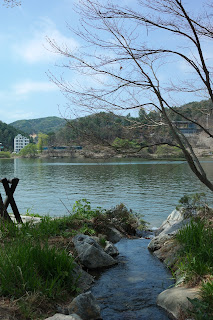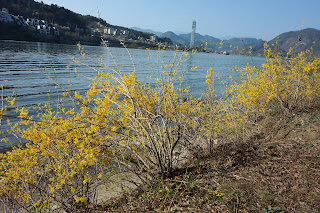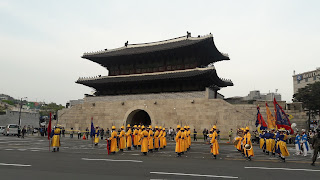Amazing opportunity and you have to be amazingly lucky to get it. And it becomes a great adventure, if not the greatest. But of course, it has its own costs, and sometimes you really have to fight for yourself.
The reason why I am writing this post is to show a little bit of the side that is usually not on social media. Because on SNS, we just put our worthy moments, and we usually hide contents that usually does not a amaze people. However, those other things in the background are essential to understand what this scholarship means. Beside the surface, it is a deep deep water, and real coping with life.
Maybe not for everyone. Maybe there are people who can adapt easily or whose culture is not so far from the Koreans. But as a European, I have to admit it is not as easy as it seems at first to integrate to Korea.
Let's begin. What is this scholarship exactly?
Full scholarship ~ three, four or sometimes five years long, depending on which program you are enrolled to.
Full tution support, settlement allowance, monthly allowance, full airfare support for once entering and once leaving the counrty, research allowance, scholarship completion grants, and medical insurance, everything included... is it?
So, here it is, what is not included in the papers.
This scholarship is designed to cover your expenses, your life in Korea, but the first fun fact is that the 900K KRW monthly allowance was the same ten years ago, and the same till now, and probably will stay the same in the future. I am not saying it's not enough... but sometimes, it is not. Especially, living in Seoul has become extremely expensive, if you don't want to live on ramyeon and rice for three consecutive years.
And believe me, you don't.
I am not going to talk about finance, but I wanted to mention it too. Having some savings is essential.
I’ve counted five points that were the hardest to cope with, at least, for me. Let me talk about each of them. These are subjective, and it is not a rank order… it may differ for everyone.
So first of all, the ramyeon-life. One of my biggest struggle throughout the three years is food. My first year was spent in the language school, in Busan and I never expected I will have problems of eating the food, because I never really had any. Actually in the first year, everything was just perfect. I was so lucky to get in a dorm with kitchen. I didn't use it too much, and yet it was a massive support when I didn't want to eat outside. I loved trying out new food, there was a bunch of different restaurants outside the campus and we could also eat at school. But after like a month or two, your realize that even those "various restaurants" has an end, because the menu is always the same, the taste is the same, and your western blood is not used to eat rice 7/7. Therefore, it is great to have alternatives, or sometimes prepare meals by yourself.
Next year, when university starts, I got super-stressed, and I didn't even noticed it at the beginning, but it affected my stomach and my nerves more than I expected. I was amazed by moving to Seoul and becoming a member of a great university. I was very lucky, the people around me were supportive, friendly, I signed up both for English and Korean classes and even if it seemed to be hard, I was very motivated. But working hard costs something eventually. I realized that kitchen was such a blessing in Busan because in Seoul, our dorm had only micro-wave so I was forced to eat out. We also didn't have a fridge at the beginning. (I recommend to not to live without a fridge, it's so inconvenient!) Anyway my stomach was upset for always eating out, as well as my psycho... I never realized before how much we are exposed to ourselves when we cannot prepare our own dishes, we don't have a home to escape, a mum to pack food for a week, or a relative you can rely on.
But, eventually, I learnt some cooking skills in micro-wave, and learnt what is the best way to encourage your psycho when you start to be desperate about what to eat: always make a plan. Plan your tomorrow, what you would like to eat. Eat what you wish. If you suddenly crave for pizza, then eat pizza, regardless to your plan. Your plan can wait for the next day.
I think eating is one of the hardest point if you live in dorm - but even if you cook, it is hard to find the proper ingredients, and it's expensive to buy everything. But better to eat well than get sick. It has so much effect on our achievement, our mental health, and stress is our biggest enemy in this fight.
So second, yeah: stress. Our generation has way harder stress-problems than our ancestors', but also, living and studying in a foreign country other than your mother tongue makes it even harder. It is stressful to talk in Korean, there is always distinction, gazes at you, there are different requirements at Uni, and you still have to struggle with it ALONE.
But we gain great coping skills and we will be able to deal with everything! We become expert in making phone calls in Korean, we start to realize that administration in our own country is not even that bad (hahaha, it is. But it's ours.) Sometimes we have good foreign friends, communities (never forget the language school friends! they are friends for life!) who share experience and warn us, so that it is eventually not that hard at all to find solutions to our problem. Eventually, we are not alone at all. There are so many similar people, we should not be ashamed of asking for help, because we are in the same fight after all. And they will help.
Additional ingredient to the lovely "stress starter-pack" is the cultural shock and acculturation.
We all struggle from this since the very beginning of our arrival, regardless to how far we came from. Of course, there are theories that a larger distance involves greater level of stress but it is not forcely true. We just have to accept it... we go through it, starting with the 'honeymoon' phase, when we are still happy and impressed by the whole new world - but yet we are ‘shocked’, somehow, but this shock pays off in a positive way. Later come the ‘crisis’, and naturally, this is the scariest part because it seems like a step back, like a disappointment in everything, including in ourselves. But it's actually not, and we are not worse because we suddenly start to dislike the country, or the culture, or both. We just start to see another side, which contributes to have better view on things.
And even if the 'crisis' is hard, we hate it, and we feel depressed, we will overcome, and we can always do something to make it easier. I think, it's not the best to run back to make endless phone calls with our beloved ones from home, but sometimes it might be helpful, too. I think it's more important to keep in touch with foreign or same nationality people in Korea, who has the same problems and can understand us 100%. I started to appreciate my friends even more from the start of the second year, when I started to have real-life difficulties. The Uni is not a joke, and I was not a freshmen in Korea so the excitement about living here dropped a bit. The end of the program was still far, and the tasks were bigger. Felt like the time did not work for me, but against me. I was apart from home for a long time, but I still had too much time to go, I felt like I did not have a home, because this country was not my home, neither. But this is not depression, and we don't have to take it too dramatically. It's just the natural part of the cultural adjustment, and the best thing is to accept it and wait patiently to overcome it. Because we will, always. But even if we feel like we have a hard time, make a fun of it. Laugh a lot on why and how ashamed you feel because of that, and you will realize it's nothing it's more dramatic than a meme from Instagram. Do not pity yourself, and do not blame yourself, because that would make it harder to overcome, and there is nothing wrong about that you are not able to accept everything smoothly.
But if you really feel lost, remember how many people are proud of you at home, and they believe that you can do it. It gives real energy.
Third thing: the gazes at you. Yes, they stare at you... a lot (Koreans). Sometimes with just curiosity, sometimes with hate, or anger, and it's frustrating. But it’s not our problem. Yes, we are different. We are very special to make it here, in Korea. They can be offensive, or envious but it does not affect us at all. Do they really hate us, foreigners? Maybe, for a reason; or maybe not, but the society taught them to do so. (or they are just simply old and senile). But do we have anything to do with their hate? No, and we are not bad people for ignoring.
Fourth: health. Very much related to the food and nutrition, and yet a different thing. Health becomes a huge difficulty once someone has a longer sickness. It involves our money, our energy, it consumes more than the physical health. And of course it is harder to fight with it in a foreign country, but it's not impossible. First of all, we should not feel pitiful that we are sick, and not be shy to ask for financial support if it's needed. It can happen to anyone, and you will always be able to pay it back sooner or later. Korea has a great system but also very expensive, so it is hard to survive on our own when we need to pay heavy bills for the hospital. But what is more important, to trust ourselves and to look forward, because a sickness (mostly) are curable, and we are great fighters in this isolated peninsula.
Unfortunately, a slow-but-effective depression factor is the fine dust thing. Yes, air pollution does exists in Korea, and not only because of China, but they like to share this reason. Sometimes, air pollution becomes the part of the everyday-life, looking like the apocalypse is just about to happen. People in our country might be worried that we live next to North Korea, but the truth is, that air pollution is a much bigger threat. And the thing is that it really affects our daily mood, and a one-week-long fine dust crise is already too long to stay still and get clean air. I will always be able to recall the pungent taste of the air I felt on my tongue and it is so sad that it stayed in my memory.
Usually, spring is known for the hardest period for air pollution, but in fact, we should be careful throughout the year. I can come any time, and this year was particularly bad in winter. Always, and always check the level and put a mask at least, because all we can do is prevention.
Fifth: loneliness. Probably this is the most dangerous feeling that you can have... because you constantly face new challenges, and you are totally alone, without a warm family support, and usually things do not go as smoothly as they would go in your country. But if you copy those hardships, you definitely gain something that could not be gained otherwise.
Honestly, I did not want to discourage anyone who decides to take the challenge. And I really hope my experiences somehow will help you. This list in of course incomplete; it is neither in rank order, I just tried to explain a little bit in my own way. (And apologies for the bad English, it is not my native language :)) This is still a great opportunity, and problems are everywhere, maybe it wouldn't be safer in another environment, who knows. I believe if someone really wants to live here, he/she will, and it will be worthy. There are plenty of amazing things in Korea, and this scholarship is much richer experience for life, than we think. But just my opinion, if you don't feel quite confident about it, you may not take it. You really have to have a plan, a purpose, because you might think later, that without a purpose, it isn't worth to fight till the end. But if you do have, take a risk, and it will probably become the greatest adventure of your life!
If you have any questions, please leave a comment below. Thank you for reading~
































































